Mehwish Abbasi is a social and environmental activist from Pakistan. She is also a journalist and recipient of the Global Ties U.S. 2022 IVLP Alumni Award for Social Innovation and Change. We spoke with Mehwish about the intersection of women’s education and climate change, her motivation to advance social justice and community-led solutions to the climate crisis, and how her IVLP experience shaped her work. Mehwish participated in the 2014 International Visitor Leadership Program (IVLP) project on “Conflict Sensitive Reporting,” implemented by Meridian International Center in partnership with WorldOregon, Boulder Council for International Visitors, and WorldDenver. All photos provided by Mehwish.
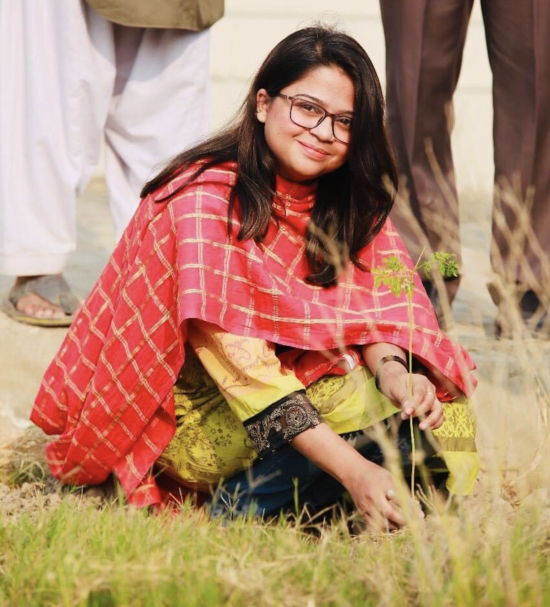
Mehwish plants a tree during the inauguration ceremony of the tree planting campaign in Sindh, Pakistan. Volunteers and the Climate Action team planted more than 3,000 plants during the five-day campaign.
What inspired you to create “Climate Action – Let Girls Learn and Educate Equally to Protect Our Planet?”
I grew up in a society where women and girls experience the most significant impacts of the climate crisis, and saw how the climate crisis increased existing gender inequalities and threatened women’s lives and livelihoods.
Girls and women in Pakistan are particularly vulnerable to the impacts of climate change. One of the most significant climate-related issues women face is displacement and the related challenges of finding housing and employment. During extreme weather, girls are susceptible to violence and sexual and physical abuse. Child marriage can be seen as a way to reduce the financial burden of caring for girls. Girls are more likely to go hungry when food is scarce. Also, certain diseases may affect girls more than boys if they are already malnourished or dehydrated, especially during menstruation, or if they are pregnant or new mothers.
My climate action journey started after the harsh reality of natural disasters such as floods, droughts, cyclones, and earthquakes, which impacted our cities and people. I realized solutions for a sustainable planet and tomorrow’s gender-equal world are unlikely to happen without the participation of half of the country’s population.
I decided to make an effort to educate girls specifically in climate-affected areas where they could not go to school nor travel because of floods, scorching sun, and drought, and help them use their power to tackle the climate crisis. The benefits are profound, transformative, and lasting for a society with educated girls who can combat climate action. Educated girls can develop better solutions to climate change.
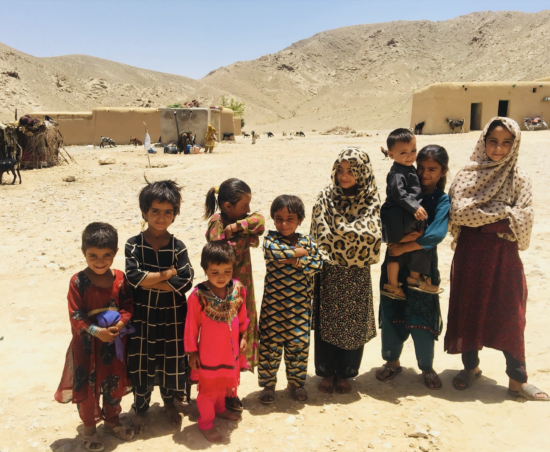
Girls from a small village in Balochistan Province of Pakistan pose for a photo during a 2018 visit by Mehiwish as part of the Education for All Campaign. The dry, climate-affected area can be seen in the background.
How did participating in the IVLP shape your work on topics such as women’s rights, youth education, and the environment?
I feel that exchange programs like the IVLP provide diversity in professions, thoughts, lifestyles, culture, regions, and so on; gathering around with people from diverse backgrounds helps to learn, inspire, brainstorm, and do more for society. The IVLP shaped me in every perspective of life. It not only enhanced my journalism and social life skills but also enriched my growth in terms of knowing more people and improving my social contacts. That leadership communication helped me in my personal and professional life. When I started organizing women empowerment-based events after coming back from the IVLP, my actions spoke with effectiveness. After returning, I started working for human rights in connection with climate change in Pakistan. I also served as the Youth Group Director for the PAK-USA Alumni Network, where I organized activities focused on girls’ education, tree planting, global warming, faith and harmony, and human rights.
There isn’t any doubt that my experience participating in the IVLP helped build my confidence as a public speaker and strengthened my vision to advance social justice and community-led solutions to climate change and development. Our exchange colleagues helped me do more for girls’ education and climate change by volunteering and providing resources. It motivated us to initiate the project, “Climate Action – Let Girls Learn and Educate Equally to Protect Our Planet,” to ensure that youth voices are heard and made part of solutions to climate issues. Because it’s not a one-person job, an entire team worked to make it a successful project; this team included many PAK-USA Alumni as volunteers.
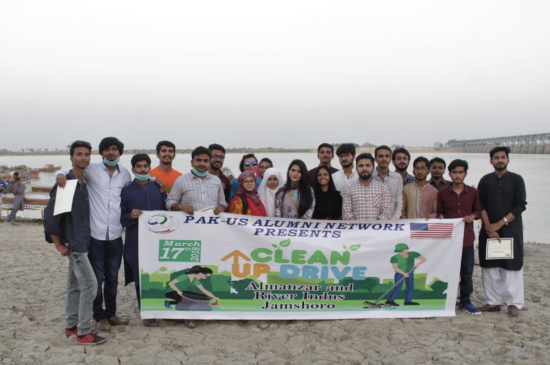
Mehwish with Clean Up Drive campaign partners in Sindh Pakistan. The project was organized with the support of the Pakistan USA Alumni Network, where young alumni cleaned up the river and planted 250 trees.
Girls’ education and community activism is at the heart of your work. How have you seen climate action and youth education change over the course of your social and environmental activism career? What’s next for you, in terms of your work on these issues?
I believe in the fact that the world needs active and lively people. I feel honored when I observe that many youngsters, girls and boys, have engaged themselves in climate action after my career as an activist. We are seeing real change. By counting how many girls go to school and are learning about climate change, we see how public awareness of the climate crisis has increased in and around my hometown. Through our awareness-raising sessions and radio programs, we have inspired new leaders to educate young women about climate change. For example, Sajida is one of the many young leaders who is using our platform to educate people about the climate crisis. She wants to address climate issues to contribute to society and engage many in her fight against climate change. Many other girls have participated in our radio and TV shows, social media campaigns, rallies, and marches. We have also raised our voices through legal platforms and engaged lawyers to advocate this issue wherever it is required, specifically when we deal with the city’s local communities and political leaders.
In the future, I look forward to engaging many young people in Pakistan to join this cause and take responsibility into their own hands because they are the world’s future. We will engage many others in volunteering for environmental and climate action activities, and we’re planning many more projects in person and virtually to have more people join us in spreading awareness about climate change. It’s time to save our environment and communities through our stories and actions instead of waiting for others to do the same for us.
Between working as the Youth Group Director for the PAK-USA Alumni Network to launching the EcoJustice Project, you’ve done a lot of important social and environmental work. How do you think young women’s education and climate change intersect?
Climate change affects girls’ education. The relationship between climate change and women’s and girls’ education goes both ways. Because educating girls is a solution, the process of getting educated is also threatened by climate change. I have seen many girls in Pakistan struggling to get educated, but social taboos and lack of information stopped them from doing so. Going to school is, by many, not considered a priority for girls. In fact, I met many girls who want a college degree but end up doing their brothers’ homework.
Climate change worsens inequalities and discrimination against girls and young women. These girls feel the most significant impact, and often do not have access to the information and resources they need to cope. In times of crisis, girls are often the first to drop out of school to help their families, earn money, run a household, or care for siblings. However, if they don’t go to school, they are less likely to understand climate change and how to manage its impacts.
Although some well-educated girls and women are working to address climate change, there is an urgent need for more girls and women to take the lead in climate policy and decision-making. Girls and women must have equal opportunities and not have to contend with stereotypes about their education and career.
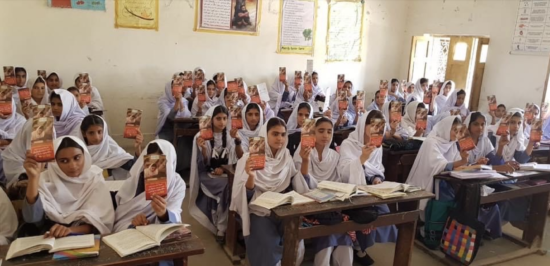
Students in a Pakistan school show their pamphlets on environmental pollution and the importance of girls’ education for climate change. These informative books were distributed during the project “Climate Action – Let Girls Learn and Educate Equally to Protect Our Planet.”
What advice do you have for young people, who are also interested in youth education, gender equality, and environmental work, as they begin their careers?
Seek opportunities. Every girl needs the chance to live free from violence and discrimination. My advice for young people is: When you find yourself in a place where you can change the lives of other women, there will be no barriers to stop you; you just need to bring yourself out of your comfort zone and do your best for them.
Supporting and empowering women is critical to achieving gender equality. Youth activists around the world should keep raising their voices for gender equality. Empowering and educating young women about women’s rights can ensure a brighter future. Please support women in your community; you can make a difference.
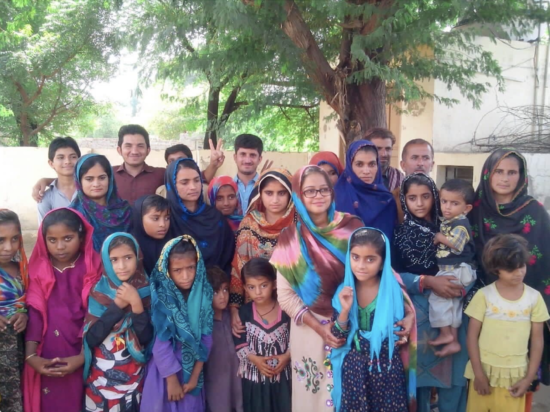
Mehwish during a 2016 visit to the village of Goth Darya Khan where she successfully enrolled 35 girls in school as part of a community-led campaign to promote girls’ education in Sindh, Pakistan.
